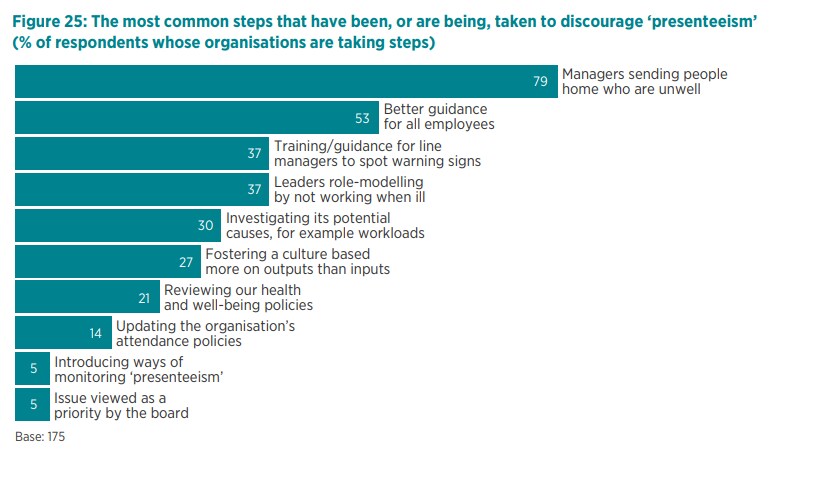Working when sick is rising and harms you and your employer. This is why

Presenteeism is on the rise. Image: REUTERS/Thomas Peter

Get involved with our crowdsourced digital platform to deliver impact at scale
Stay up to date:
Future of Work
If you’ve been ill enough to call in sick, but felt pressure to turn up at work, you’re not alone. Working when sick, being physically or mentally unwell is called presenteeism – and it's becoming more common.
As many as 83% of employees said they’d seen it in their workplace in the past 12 months, according to a survey of health and wellbeing at work by the UK’s Chartered Institute of Personnel and Development. In 2010, only 24% had experienced presenteeism.
At the same time, the number of UK employees taking sick leave has fallen to an all-time low of 5.9 days per person per year. Almost two-thirds of employees told the CIPD that they worked during their holidays or when on sick leave.

Working when sick is more harmful than absence
A quarter of employees believe presenteeism is getting worse. The CIPD says it's potentially more harmful for individuals and companies than sickness absence. And it warns that employee wellbeing needs to be taken more seriously by business leaders.
The costs to business are well documented. It has been estimated presenteeism costs US firms $226 billion a year. In Japan, the cost of reduced performance due to working when sick was $3,055 per employee each year. In the UK, ‘impaired work efficiency’ due to mental ill health costs $790 per person each year, twice the cost of absenteeism.
But few companies are doing anything about it, with just under a third of those surveyed taking any action. Only 30% of those tried to investigate the cause of presenteeism.

Only a third of people believed that their leaders encouraged mental wellbeing through their actions and behaviour, while more than two-fifths said management style was a cause of stress – up from a third in 2018.
“Employers can introduce a suite of exemplary wellbeing policies and make a serious investment in employee health, but if their activity is not rooted in how people are managed, it will not have a real impact,” says the CIPD.
A bad example
Research by the UK Institute of Employment Studies found that business culture is a major cause of presenteeism. Employees who know that being absent would make more work for colleagues, for example teachers and nurses, are most likely to work while unwell.
Managers who set a bad example by working when sick encourage similar behaviour in their teams. Job insecurity for staff on fixed-term contracts or in firms facing restructuring is a factor, especially when bosses regard attendance as a sign of commitment.
Policies designed to reduce absenteeism could lead to more illness in the workplace and lower productivity. Reducing sickness benefits results in people going to work when they would previously have reported sick.
Health insurer Vitality says health-related lost productivity is costing the UK economy more than $100 billion (£77.5 billion) a year which, it argues, could be reduced significantly if companies invested in adequate health and wellbeing programmes for their employees.

Accessing benefits
Vitality’s annual Healthiest Workplace survey found that 40% of staff said health problems had affected their work in the past year. UK employees lost an average of 35.6 days of productive time due to ill health and more than 90% of that time was due to working when sick which is called presenteeism. Productivity loss was higher among lower-income and younger workers.
Although women have better health indicators than men, being less prone to high blood pressure, diabetes and high cholesterol, they lost more working hours to ill health. Depression was almost twice as prevalent among female workers over the age of 60 than men of the same age.
Getting workers to use wellbeing benefits is a problem for some employers. Companies in the Vitality survey provided an average of 20 health and wellbeing measures for staff, including fresh fruit and clinical screening. But only just over a quarter of employees were aware they were available.
Don't miss any update on this topic
Create a free account and access your personalized content collection with our latest publications and analyses.
License and Republishing
World Economic Forum articles may be republished in accordance with the Creative Commons Attribution-NonCommercial-NoDerivatives 4.0 International Public License, and in accordance with our Terms of Use.
The views expressed in this article are those of the author alone and not the World Economic Forum.
Related topics:
The Agenda Weekly
A weekly update of the most important issues driving the global agenda
You can unsubscribe at any time using the link in our emails. For more details, review our privacy policy.
More on Future of WorkSee all
Kate Whiting
April 17, 2024
Andrea Willige
February 29, 2024
Kara Baskin
February 22, 2024






